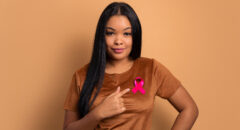
Last week, the U.S. Preventive Services Task Force (USPSTF)—a panel of experts that issues guidelines about preventative care—posted a draft recommendation that all women start bi-annual (every other year) routine breast cancer screening at 40 years old. This is a ten-year jump from the task force’s previous recommendation of starting breast screening at 50.
“I think it’s a small step in the right direction after a huge step in the WRONG direction,” says Dr. Monique Gary, DO, MSc, FACS—Medical Director at Grand View Health/ Penn Cancer Network. “When their last recommendations were released in 2016, it did more harm than good in a few ways. Besides recommending against self-breast exams, it spurred all these studies… spending valuable resources to prove harm of screening guidelines for Black women. In my opinion, it was tragic, when it is quite evident that delays in screening are one of the many forces at play in our presentation of more advanced disease.“
Many responses to this recent recommendation have overlooked a critical detail—it only applies to all people assigned female at birth who are at average risk for breast cancer. This guidance does NOT apply to women with dense breasts, Black women, or women with a family history of breast cancer. Black women, we are not at average risk!
The disturbing facts*
Black women under 35 get breast cancer at twice the rate of white women and die at three times the rate. Black women ages 40-49 are 80% more likely to die of breast cancer than white women. Black women are three times more likely than white women to be diagnosed with triple-negative breast cancer—a particularly aggressive subtype of breast cancer associated with worse outcomes, early relapse, high frequency of metastasis, and high mortality rate—and have the lowest survival rate at each stage of diagnosis.
RELATED: Should Black Women Be Screened Earlier For Breast Cancer?
Triple-negative breast cancer is more common in young women, and those diagnosed with breast cancer under the age of 40 are twice as likely to have TNBC than those between the ages of 50 and 64. Women who are diagnosed with TNBC are 53% more likely to be under 40 years old. TNBC disproportionately occurs in younger Black women who are more likely to have poorer prognostic features than older patients upon diagnosis.
More than that, though, women with extremely dense breasts have a four to six times greater risk of developing breast cancer than women with mostly fatty breasts. Black women have statistically significantly higher (21.1%) absolute breast area density than white women. Black women also have statistically significantly (44.9%) higher volumetric density than white women. You don’t know whether you have dense breasts until you have had a mammogram.
Clearly, waiting to get our first mammograms at age 40 is way too late for Black women.
RELATED: 12 Things Black Women Need to Know About the New Mammogram Guidelines
Black Women, so what does this mean for us?
As both a triple-negative breast cancer survivor and the CEO and co-founder of TOUCH, The Black Breast Cancer Alliance (TOUCHBBCA), I read the updated task force recommendations with growing anger and concern for our young Black women, especially my own daughters. My family is currently fighting with our health insurance companies to cover the cost of mammograms for my daughters because we have three generations of breast cancer in our family HERstory.
To understand the scientific perspective outside of my own intense maternal reaction, I reached out to the brilliant TOUCHBBCA medical advisory board. Their overall thoughtful perspective was that moving the age of the first mammogram from 50 to 40 was a significant and long overdue first step for average women. But, once again, Black women are not average!
Black women, so what can we do to protect themselves?
Black Breast Cancer is a different disease and, in the same vein, Black Breast Health looks different for Black women. Too often young, Black women unaware of their risk are dismissed by doctors and end up with delayed, more advanced breast cancer diagnoses. TOUCHBBCA created For the Love of My Gurls to speak up—we must talk about Black Breast Health to save each other. It’s up to us to take care of our gurls. Here are a few ways, recommended by our medical advisory board, that Black women can protect themselves while we await appropriate guidelines for higher-risk groups:
RELATED: Navigating Breast Cancer: Understanding Your Treatment Options
1. Individualized risk assessments
The first step in assessing your individual risk is knowing your HERstory or family health history! Your lifestyle, genetics, & personal and family health history all impact your cancer risk. Up to 10% of breast cancers are hereditary – meaning you may share the risk with your family. That’s why it’s so important to know your HERstory. Talk to both sides of your biological family to learn about all of the cancers in your family tree. If accessing your HERstory is difficult or impossible because of adoption, death, or other family events, know that there are other options for you. Visit loveofmygurls.org to learn more.
In addition to your HERstory, our medical advisors also recommend that Black women have a routinized risk assessment by age 25 to ensure they are not high risk and shouldn’t begin screening sooner.
“Early accurate risk assessment (i.e. before 25) is key, especially for Black women, and many Black women will benefit from beginning screening even earlier than 40,” advises Dr. Oluwadamilola Fayanju, MD, FACS—The Helen O. Dickens Presidential Associate Professor and Chief of the Breast Surgery Division at Penn Medicine.
You can ask your primary healthcare provider for a risk assessment or you can participate in a comprehensive online-based individualized risk assessment program like the WISDOM study (WisdomStudy.org).
“We need to move in the direction of individualized risk assessment to inform us on who needs to be screened when and how often,” says Dr. Sara Horton, MD—Executive Director of Access and Diversity at Quantum Leap Healthcare Collaborative. “It is obvious that there is something that is happening in the Black population (be it genetic, environmental, etc.) that is causing more of our women to be diagnosed with breast cancers at an earlier age. That is why I recommend the WISDOM study which is a virtual study using genetic info, breast density and traditional criteria to determine a risk and support informed decision-making.” For the Love of My Gurls partners with The WISDOM Study, which will be open to young women starting at age 30 in the coming months.
2. Breast self-exams
“My concern is that few organizations endorse self-breast exams,” explains Valarie Worthy, MSN, RN—Co-Founder and Director of Community Outreach at TOUCHBBCA and Patient Navigator Manager at Duke Cancer Center. “So, if mammograms begin at 40 and we have a significant number of Black women who are diagnosed with breast cancer under the age of 40 and self-breast exams are discouraged because the data has not shown that it saves lives, what should Black women do?”
For the Love of My Gurls recommends that young, Black women get to know their gurls and know their normal through monthly breast self-exams. Checking your breasts at least one week after your period should become part of your regular self-care routine.
3. Research and data
The U.S. Preventive Services Task Force and other major groups all make recommendations and policies based on quantitative research and data. When Black women don’t participate in that research, the results don’t reflect our needs.
“Please let's figure out how to get evidence,” says Dr. Olufunmilayo I. Olopade, MD—Walter L. Palmer Distinguished Service Professor of Medicine, Professor of Human Genetics, and Director of the Center for Clinical Cancer Genetics and Global Health at the University of Chicago. “Some women should start screening at 30 and we need to know. Black is not a monolithic group, and we should not forget that we need better screening tools. We are going to need more research to derive better evidence.”
From screening guidelines to life-saving medications, it’s important that Black women are counted and heard. Only by participating in research can we make a difference in these guidelines and change the game for all Black women.
“We do have a lot more research that needs to be performed in the area of earlier screening for higher risk patients (especially women of color) under the age of 40 who do not necessarily have a genetic mutation,” explains Dr. Candice Thompson, MD—Clinical Assistant Professor of Surgery in Breast Surgical Oncology at Stanford Medicine. Learn more about participating in breast cancer research at whenwetrial.org.
If you do find something abnormal or unusual at any point in the process, insist on the care that you deserve. And know that we at TOUCH, The Black Breast Cancer Alliance (touchbbca.org) will continue to bring these discussions to stakeholders, legislators and researchers to fight to change the guidelines until they are in favor of saving the lives of Black women.








